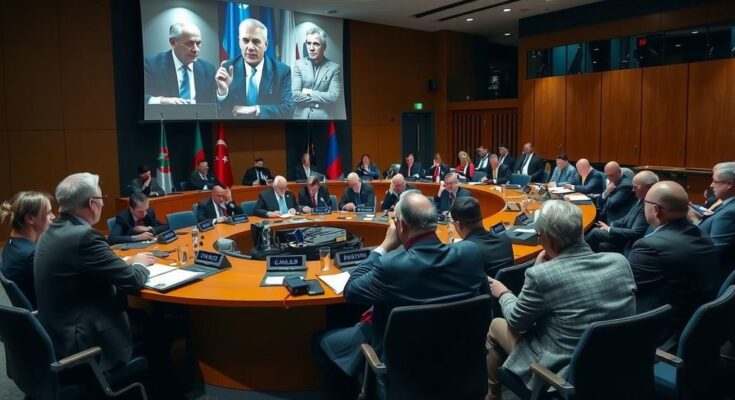As COP29 approaches in Baku, the EU faces pressure from 17 human rights organizations to address deteriorating conditions regarding political prisoners and civil rights abuses in Azerbaijan. A recent surge in arrests highlights the oppressive measures taken by the regime against dissenters. EU leaders are called to leverage this international platform by advocating for the release of imprisoned activists and ensuring that human rights are integral to future political and economic relations, particularly in energy cooperation.
As the 29th UN Climate Change Conference (COP29) approaches in Baku, Azerbaijan, the European Union leaders are urged to confront the Azerbaijani government about its increasingly oppressive human rights practices. A coalition of 17 international human rights organizations, including Human Rights Watch, has called for direct discussions regarding the politically motivated imprisonments of opposition figures and journalists. They advocate for heightened support for civil society and independent media, emphasizing the importance of human rights in the EU’s engagement with Azerbaijan amid its history of aggressive suppression of dissent. In recent years, Azerbaijan’s authoritarian grip has tightened, with the regime employing politically driven detentions and restrictive laws to stifle independent voices. The current climate is particularly concerning, as recent statistics reflect at least 11 journalists arrested on fabricated criminal charges in a mere few months. Prominent human rights defenders like Anar Mammadli have been jailed during politically charged periods, such as after raising concerns about election legitimacy. The EU is pressed to leverage its economic ties to ensure human rights protections, which are crucial to a cohesive partnership in energy and beyond. Amid this oppressive backdrop, the international community eyes COP29 as an opportunity for the EU to raise these critical issues, pushing for immediate engagement with imposed restrictions on civil discourse. Leaders are encouraged to publicly affirm their commitment to human rights and highlight the necessity of civil society’s role in achieving effective climate action. The dialogue should extend to meeting imprisoned activists and their families, reaffirming a strong stance against arbitrary detentions that disrupt societal progression. The stark reality is that Azerbaijan ranks among the worst in implementing human rights judgments from the European Court of Human Rights, and its trend of oppression continues unabated. Even in the face of global scrutiny exemplified by COP29, the government’s crackdown on dissenting voices remains relentless, signaling a troubling indifference to human rights obligations. The EU’s engagement in Baku is awaited not just as a political maneuver but as a vital intervention that could steer Azerbaijan toward accountability and respect for fundamental human rights.
The call for urgent action regarding human rights in Azerbaijan occurs against the backdrop of COP29, underscoring the unique opportunity for international leaders to catalyze change within an authoritarian regime. For years, Azerbaijan has been criticized for its systematic suppression of dissent, independent journalism, and civil society, relying on politically motivated arrests and repressive laws to silence opposition. The significance of the conference lies not only in climate discussions but also in its potential to pressure the Azerbaijani government to improve human rights practices as a precondition for continued economic partnerships, particularly in energy cooperation. The recent escalation of arrests and intimidation of activists amplifies the need for EU leaders to focus their discussions on the human rights crisis as a critical component of their agenda.
The urgency of addressing human rights violations in Azerbaijan has never been more pronounced as COP29 looms on the horizon. EU leaders must seize this moment to advocate for the release of imprisoned activists and foster a climate of accountability within the Azerbaijani government. By emphasizing the inseparable link between human rights and climate action, the EU can reaffirm its commitment to protecting civil society while pressing Azerbaijan toward an inclusive and humane governance model. The success of COP29 extends beyond climate initiatives; it hinges on recognizing and rectifying the injustices that stifle free expression, ensuring that all voices are heard in the fight against climate change.
Original Source: www.hrw.org



